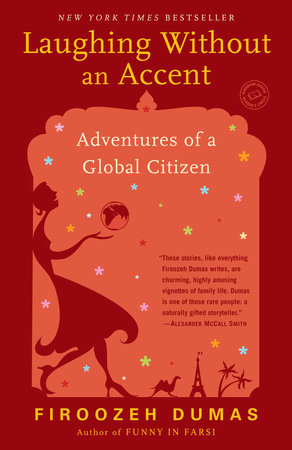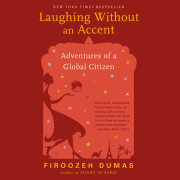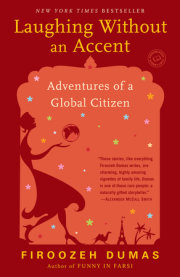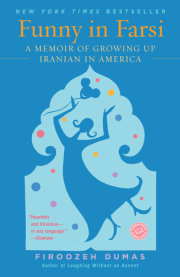Funny in Persian
Iran does not currently adhere to international copyright laws. This comes as a shock to most people, given Iran’s law-abiding image.
Not adhering to international copyright laws means that any book, regardless of origin, can be translated into Persian and sold in Iran. No matter how poorly a book might be translated, the author has no control. No artist wants his name on a work that does not represent him fairly, but in Iran, tell it to the judge, and he doesn’t care. When Abbas Milani, a very well respected author and professor, found a Persian translation of his history book, he found it to be completely different from the original. He contacted the publisher in Iran, who told him, “Our translation is better than your book.”
Every time a Harry Potter installment is released, there is a mad rush around the world to translate the book. One Iranian publisher divides each book into about twenty sections, giving each section to a different translator. That way, his version, which must resemble a patchwork quilt more than anything J. K. Rowling actually wrote, is the first on the Iranian market.
Knowing such horror stories, I feared the inevitable translation of my memoirs, Funny in Farsi, into Persian. Funny in Farsi is a collection of humorous vignettes, verbal snapshots of my immigrant family. In that book I was very careful not to cross the line into anything embarrassing or insulting. My goal was to have the subjects of my story laugh with me, not cringe and want to move to Switzerland under assumed names. But for all I knew, a translated version might make my family look like fools. Even though I had not used my maiden name in the original printing of the book, it took about twelve minutes for the average Iranian to figure out my last name, Jazayeri. Iranians are very good that way.
I decided to make my own preemptive strike and find a translator in Iran. This was not as easy as it sounds. Humor, like poetry, is culture-specific and does not always work in translation. What’s downright hilarious in one culture may draw blank stares in another.
When we came to America, my family could not figure out why a pie thrown in someone’s face was funny. The laugh tracks told us it was supposed to be hilarious, but we thought it was obnoxious. We also saw it as a terrible waste of food, a real no-no for anyone from any country in the world except for the United States.
We were also baffled by Carol Burnett’s Tarzan yell. Anyone who watched her show regularly knew that during the audience question-and-answer section, one person would inevitably ask her to do her Tarzan yell. We always hoped she would say, “Not tonight.” But instead, she would let out a loud and long yell that left the audience in stitches and us bewildered. “She shouldn’t do that,” my dad always said. We agreed and waited for all her other sketches, which we loved. There was just something goofy about her that made us laugh, especially when she was with Tim Conway. His humor had much to do with facial expressions and body language, which, thankfully, did not require translation. There is also something universally funny about the contrast between a short man and a tall man, which was played out with Harvey Korman. Given that most of the men in my family are closer in height to Tim Conway than to Harvey Korman, I assume there was among us a nervous understanding of the foibles of the short man.
We also adored Flip Wilson, especially when he became Geraldine. That character sketch, with “Geraldine’s” sassy attitude, had us rocking back and forth in laughter on our ugly brown striped sofa. One time, Flip Wilson sang “He put the lime in the coconut” in his high-pitched mock-sultry Geraldine voice, and my father laughed so hard that he cried. I didn’t think it was that funny, but watching my father laugh made us all laugh. The odd thing is that thirty-five years later, my father still remembers some of the words to that song, singing it as Kazem imitating Flip Wilson imitating Geraldine. It sounds nothing like the original, especially when he ekes out a “nee nee nee nee” instead of the forgotten lyrics.
I knew that Funny in Farsi would be a difficult book to translate because so much of its humor has to do with the American culture of the seventies. How does one translate “Shake ’n Bake” for cultures where slow cooking, not speed and ease, is the preferred method of food preparation, where a woman standing in her kitchen shaking a drumstick in a plastic bag and looking downright happy would cause concern? How does one convey to someone who has never seen The Price Is Right that the words “Come on down!” are always followed by a hysterical person shrieking and jumping up and down?
Through my uncle, who knew someone who knew someone, I was put in touch with a well-known humor translator living in Iran. The same week I started corresponding with him I received a very polite e-mail from Mohammad, another translator in Iran, asking for permission to translate my book. I thanked him but told him I already had someone. I deleted his e-mail.
Before we had a chance to formally agree on anything, my designated translator became ill, and it was obvious that I would have to find someone else. I was stuck, since I had deleted Mohammad’s e-mail. A month later, I received another e-mail from Mohammad telling me that he was still interested should I write another book. And this is how Mohammad Soleimani Nia, my translator, came into my life.
To test Mohammad’s skill, I asked him to translate one of my stories. I was quite pleased with the results and knew that, serendipitously, I had stumbled upon the right person.
Then we got started. Mohammad translated story by story and e-mailed each one to me. My father and I read each one and I e-mailed back our comments, most of which had to do with nuance. My father particularly objected when Mohammad translated “my father’s receding hairline” to “my father’s bald head.” I immediately sent Mohammad an e-mail quoting my father exactly: “I am not Yul Brynner!” A profusely apologetic e-mail followed.
Some of Mohammad’s mistakes revealed what life is like in the Middle East. In one story, I mentioned “eyes meeting across a room and va va va boom.” This was translated as “eyes meeting across a room and bombs going off.” I had to explain to Mohammad that, in America, “boom” is love.
In a story about Christmas, I wrote about “the bearded fellow” coming down people’s chimneys. Mohammad translated this literally. In Iran, however, a “bearded fellow” coming down the chimney is not a happy thought. The idea of going to bed so a bearded man, Khomeini perhaps, can come down the chimney would not cause visions of sugarplums dancing in anyone’s head. Instead, one would find frantic people packing their belongings, fast.
The title also had to change. Funny in Farsi is not funny in Farsi, or rather Persian, which is the correct name of the language in English. Saying, “I speak Farsi,” is like saying, “I speak français.” I was more than happy to let that title go since it has been the subject of many long e-mails from Iranians with far too much free time on their hands, accusing me of spreading misinformation about our vastly underappreciated culture. “The language is called Persian!” they tell me. I know. Please, should any reader, Iranian or otherwise, feel the urge to e-mail me with a complaint about the incorrect use of the word “Farsi” in the title of my previous book, please, instead, look up the words “humorous alliteration.”
In Iran, the title was changed to Atre Sombol, Atre Koj, meaning The Scent of Hyacinths, the Scent of Pine, which refers to the contrasting smells of the holidays. The Iranian New Year is associated with the scent of hyacinths, and Christmas, with the scent of pine—not to mention the bearded fellow coming down the chimney, although technically, that should not smell.
Then it was time for the censors. No movie or book can be made in Iran without approval from the government. Although there are no written guidelines stating exactly what is prohibited, common sense dictates that in an Islamic theocracy, nudity, profanity, insulting the religion or government, and perhaps anything having to do with Paris Hilton are all no-nos. Aside from those guidelines, one is at the mercy of the individual government employee assigned to each book. I hoped my stories would end up in the hands of one of those fun-loving, laugh-a-minute censors who would wave his teacup in the air, declaring, “Let’s change the name of that street again, this time to Firoozeh Dumas Avenue.”
I asked Mohammad how long the government would take to return my book. Surprisingly, there are no guidelines there, either. Perhaps some sort of Oil-for-Guidelines program could be negotiated.
Mohammad told me that the translation for James Joyce’s Ulysses has been at the censor’s office for seventeen years. I imagined the bearded censor sitting as at his desk, book open, chin back, mouth open, snoring loudly. That’s an example of a book that could use some nudity.
My stories were returned after six months. Three changes had to be made, two minor, one major.
The censor objected to my describing someone looking as if God had switched her nose with the beak of a toucan. One cannot blame God, I was told. In the Persian version, I reworded the sentence, using a passive voice, claiming that the woman’s nose looked as if it had been switched. One would think that in a book of humor some things would be obvious, but apparently not. Perhaps I had written the equivalent of Carol Burnett’s Tarzan yell.
Copyright © 2008 by Firoozeh Dumas. All rights reserved. No part of this excerpt may be reproduced or reprinted without permission in writing from the publisher.











